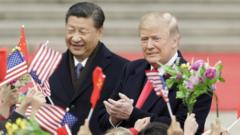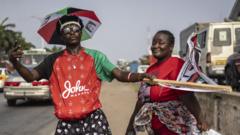**As the world's second-largest economy meets its goals, experts argue deeper economic troubles could hinder future growth.**
**China Faces Economic Headwinds Beyond Trump Tariffs**

**China Faces Economic Headwinds Beyond Trump Tariffs**
**Growing economic challenges loom for China despite steady growth figures as experts highlight deeper issues.**
China's economic landscape is shifting as the government celebrates achieving a growth target of 5% for 2024, despite facing one of the slowest growth rates in decades. An announcement from Beijing revealed that the last three months of the year saw a rebound, credited largely to stimulus measures enacted in response to prolonged issues like a property crisis and high local government debt.
While the World Bank's projections indicate a potential growth rate of 4.9% for the year, investors are cautious due to the looming threat of tariffs on Chinese goods, potentially amounting to $500 billion, by President-elect Donald Trump. However, experts caution that there are significant underlying problems in China's economy that extend beyond these tariffs.
**1. Export Challenges in a Tariff-Minded World**
Recent tariffs have already begun exerting pressure on Chinese exports. There's a growing consensus about a likely economic slowdown by 2025, as exports, which previously helped China rebound from its economic slump, now face barriers. With accusations from the U.S., Canada, and the European Union regarding overproduction, Chinese manufacturers are redirected towards emerging markets which lack the robust demand of Western nations. This pivot could spell trouble for suppliers and energy sector partners as well.
**2. Eroding Consumer Spending**
China's property sector traditionally underpinned household wealth, yet the ongoing real estate crisis has hit spending hard, with consumer contribution to economic activity plummeting from 59% to just 29% amid the downturn. Despite aggressive policies aimed at revitalizing the property and financial markets, overproduction has led to an oversupply of homes and properties. Experts indicate that until deeper economic issues are resolved, such as rising public debt and stagnant wages, household spending may not recover to pre-pandemic levels.
**3. Declining Foreign Investments**
Despite pushing for advancement in industries like renewable energy and electric vehicles, the allure for foreign businesses to invest in China has diminished. Geopolitical uncertainties, alongside domestic economic challenges, have undermined investor confidence. Firms express a desire for more diversified investment prospects, as apprehensions about stable growth in China increase. Experts believe that without significant reforms to stabilize property markets and improve job growth, the nation might see less robust economic performance.
Research from China Dissent Monitor suggests social unrest is on the rise, highlighted by over 900 protests in late 2024 concerning economic grievances. The Chinese Communist Party, which relies heavily on economic prosperity for its legitimacy, must address these mounting challenges to ensure continued stability. As China's leaders navigate this complex landscape, they face critical decisions that will shape the nation's economic future.
While the World Bank's projections indicate a potential growth rate of 4.9% for the year, investors are cautious due to the looming threat of tariffs on Chinese goods, potentially amounting to $500 billion, by President-elect Donald Trump. However, experts caution that there are significant underlying problems in China's economy that extend beyond these tariffs.
**1. Export Challenges in a Tariff-Minded World**
Recent tariffs have already begun exerting pressure on Chinese exports. There's a growing consensus about a likely economic slowdown by 2025, as exports, which previously helped China rebound from its economic slump, now face barriers. With accusations from the U.S., Canada, and the European Union regarding overproduction, Chinese manufacturers are redirected towards emerging markets which lack the robust demand of Western nations. This pivot could spell trouble for suppliers and energy sector partners as well.
**2. Eroding Consumer Spending**
China's property sector traditionally underpinned household wealth, yet the ongoing real estate crisis has hit spending hard, with consumer contribution to economic activity plummeting from 59% to just 29% amid the downturn. Despite aggressive policies aimed at revitalizing the property and financial markets, overproduction has led to an oversupply of homes and properties. Experts indicate that until deeper economic issues are resolved, such as rising public debt and stagnant wages, household spending may not recover to pre-pandemic levels.
**3. Declining Foreign Investments**
Despite pushing for advancement in industries like renewable energy and electric vehicles, the allure for foreign businesses to invest in China has diminished. Geopolitical uncertainties, alongside domestic economic challenges, have undermined investor confidence. Firms express a desire for more diversified investment prospects, as apprehensions about stable growth in China increase. Experts believe that without significant reforms to stabilize property markets and improve job growth, the nation might see less robust economic performance.
Research from China Dissent Monitor suggests social unrest is on the rise, highlighted by over 900 protests in late 2024 concerning economic grievances. The Chinese Communist Party, which relies heavily on economic prosperity for its legitimacy, must address these mounting challenges to ensure continued stability. As China's leaders navigate this complex landscape, they face critical decisions that will shape the nation's economic future.




















